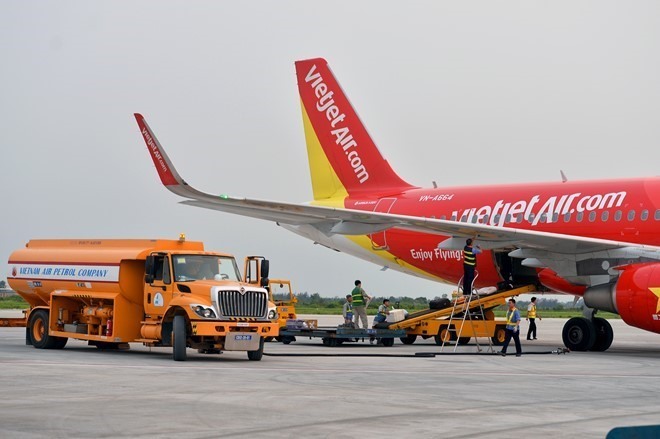 Economy
Economy

Airline stocks may see a rising wave this year with the debut of budget airline Vietjet on the HCM Stock Exchange later this month in a similar scenario like what happened to beer stocks following the listings of Sabeco in the end of 2016.
 |
| Vietjet will put its entire 300 million shares on the HCM City bourse on February 28 at the starting price of VNĐ90,000 (US$3.96) per share in the first, most expected IPO of 2017, which values the low-cost carrier at $1.2 billion. — Photo zing.vn |
Mai Hương
HÀ NỘI – Airline stocks may ride a rising wave this year with the debut of budget airline Vietjet on the HCM Stock Exchange later this month, in a scenario similar to the impact of Sabeco’s 2016 listing on of beer stocks in general.
Vietjet will put its entire 300 million shares on the HCM City bourse on February 28 at the starting price of VNĐ90,000 (US$3.96) per share in the first, most expected IPO of 2017, which values the low-cost carrier at $1.2 billion.
On the Over-the-Counter (OTC) market, Vietjet’s shares have been purchased at VNĐ120,000 apiece.
Investors expect share prices to soar after the official listing, just as it happened to beer makers Habeco (BHN) and Sabeco (SAB).
Price of Habeco shares shot from the debut price of VNĐ39,000 to VNĐ225,000 a share in just two months on the Unlisted Public Company Market (UPCoM) in December 2016. Sabeco’s shares soared from VNĐ111,000 on its debut day of December 6, 2016 on the HCM City exchange to VNĐ216,000 this week.
Vietjet’s listing is expected to provide fresh impetus to airline stocks as well as the stock market as a whole.
New wave
A total of nine airlines and aviation-related service companies are currently listed on three exchanges, with trading on the UPCoM. These include national flag carrier Vietnam Airlines and Airports Corporation of VietNam (ACV).
Only three companies are listed on the two official exchanges: Nội Bài Cargo Terminal Service JSC (NCT) on HOSE; and Đà Nẵng Airports Services JSC (MAS) and General Aviation Import Export JSC (ARM) on the Hà Nội exchange.
“There could be a spillover effect on other stocks after the Vietjet’s listing, like what happened to beer stocks in the end of last year,” said Nguyễn Xuân Bình, deputy head of analysis at Bảo Việt Securities Co.
Airline stocks are expected to attract investors given the bright prospects seen for the local aviation industry as a growing economy, rising middle class and deepening international integration creates rapidly rising demand for air travel, Bình said.
In its report last year, the International Air Transport Association (IATA) forecast that Việt Nam’s aviation industry will be among the five fastest growing markets in the world by 2035.
“The majority of the market shares are in the grip of a few major airlines. Thus, their positive business prospects will likely attract cash flows,” Bình said.
Shares of Vietnam Airlines have climbed over 51 per cent since its debut on January 3, 2017, while that of the Airports Corporation of VietNam has doubled since its listing on November 21 last year.
The reference price of Vietjet was set based on the average P/E ratio of 11.52. With the daily trading limit of 20 per cent on either side, the aviation company’s share price could range between VNĐ72,000 and VNĐ108,000 per share on the first trading day.
Vietjet reported record revenues of VNĐ27.5 trillion in 2016, up 39 per cent year-on-year. Net profit of the parent company was VNĐ2.3 trillion. It has targeted a profit of nearly VNĐ3.4 trillion in 2017.
Meanwhile, Vietnam Airlines estimates its profit hit a record VNĐ1.6 trillion in 2016, a five-fold increase over the previous year. Its total revenues reached VNĐ59 trillion. In 2017, it targets lower profits at nearly VNĐ1.2 trillion, based on expectations of volatile oil prices.
In the medium and long term, Bình said local airlines may face stiffer competition from other international airlines which could weigh on their earning prospects. — VNS




